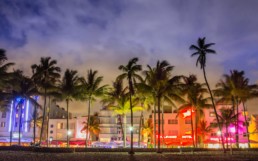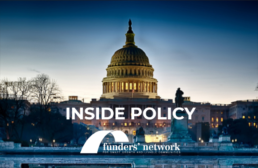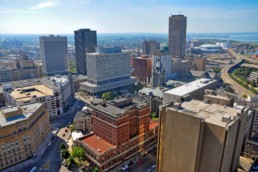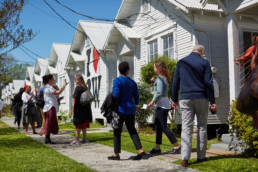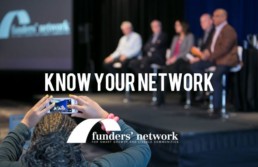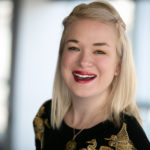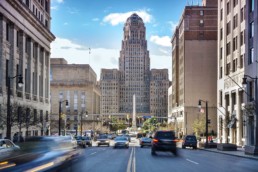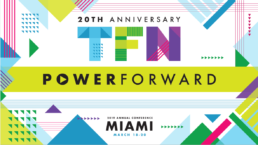Foundation Official Wants Philanthropy to Use Money to Heal, Not Divide
By: TFN Staff
Tyler Nickerson, a 2017 PLACES fellow and currently the first vice president of philanthropy banking at Amalgamated Bank, recently sat down for the Chronicle of Philanthropy with best-selling author and vice president of programs and advocacy at the Schott Foundation for Public Education Edgar Villanueva to talk about his new book Decolonizing Wealth in which he gives guidance on how to heal philanthropy.
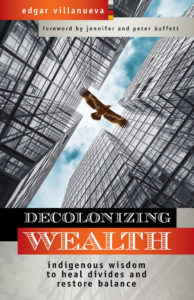 "Philanthropy is in the midst of a moment of contemplation and reflection. Many donors and foundation officials recognize that the beliefs, structures, and practices they’ve held are no longer serving their missions, especially if they don’t put people of color and others who have been marginalized at the center of their missions.
"Philanthropy is in the midst of a moment of contemplation and reflection. Many donors and foundation officials recognize that the beliefs, structures, and practices they’ve held are no longer serving their missions, especially if they don’t put people of color and others who have been marginalized at the center of their missions.
Of all the written opinions about what philanthropy should do going forward, none has landed as clear and heartfelt as Edgar Villanueva’s call for donors to tackle the colonized economic history of America. In his just-released book, Decolonizing Wealth, Villanueva applies what he has learned as a top official of the Schott Foundation and a member of the Lumbee Tribe in North Carolina to cast a vision for the steps philanthropy must take to fulfill its definition as the love of humanity."
Read the full piece in The Chronicle of Philanthropy here.
About the Author
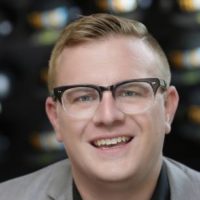 Tyler Nickerson is a regular contributor to the Chronicle of Philanthropy and is first vice president at Amalgamated Bank. Previously he served as the founding director of investments and state strategy at the Solutions Project and program manager at the Dyer-Ives Foundation. You can find him on Twitter at @tylerwnickerson.
Tyler Nickerson is a regular contributor to the Chronicle of Philanthropy and is first vice president at Amalgamated Bank. Previously he served as the founding director of investments and state strategy at the Solutions Project and program manager at the Dyer-Ives Foundation. You can find him on Twitter at @tylerwnickerson.
The views and opinions expressed in this article are those of the author and do not necessarily reflect the official policy or position of Amalgamated Bank.
#TFNMiami Spotlight | Hurricane Michael recovery, a beloved local theatre opens its doors to all, and Stoneman Douglas students head on tour
By Martha Cecilia Ovadia, Senior Program Associate, Equity & Communications
In advance of TFN's 2oth Anniversary Conference: Power Forward in Miami, we'll be sharing interesting and insightful resources that provide context for many of the issues we'll explore as part of our annual conference, which takes place March 18-20, 2019.
Don't forget to catch our weekly #MiamiSpotlight and #TFNMiami news on our twitter (Funders_Network) and facebook (Funders' Network for Smart Growth and Livable Communities) feeds, and check out our TFN 20th Anniversary: Power Forward annual conference page for updates on speakers and sessions.
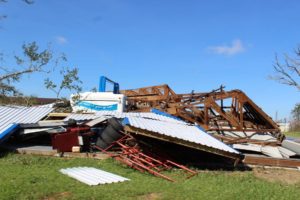 Florida towns face dark weeks without power. ‘This isn’t a restore. This is a rebuild.’ (Samantha J. Gross and Elizabeth Koh | Miami Herald | October 16, 2018)
Florida towns face dark weeks without power. ‘This isn’t a restore. This is a rebuild.’ (Samantha J. Gross and Elizabeth Koh | Miami Herald | October 16, 2018)
A week after Hurricane Michael’s rampage, large swaths of the Florida Panhandle and tens of thousands of residents face a dark, powerless future. Major utilities say it will still take weeks to repair downed lines and poles and reconnect customers — and that’s only for the homes and businesses in good enough shape to “take electrical service.”
The reality is that mass damage left by Michael — which left a monster 80-mile-wide path of ruin — means it may take even more time to turn the lights back on in damaged structures. Leaders in some counties are warning it could take up to a month to fully restore power to what is still standing and far longer for homes that were leveled and need to be rebuilt. Read more here.
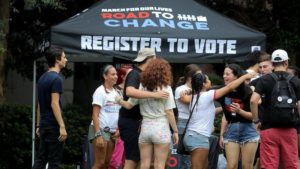 Stoneman Douglas Student Activists Plan D.C. Summit And Multi-City Tour Ahead Of Election Day (Dan Sweeny| WLRN | October 16, 2018)
Stoneman Douglas Student Activists Plan D.C. Summit And Multi-City Tour Ahead Of Election Day (Dan Sweeny| WLRN | October 16, 2018)
The Road to Change has an additional dozen stops across the country and the state, ending on Election Day in Parkland, where Marjory Stoneman Douglas High Schoolstudents started the movement. Another group of students from the school is helping put together a gun-control summit in Washington, D.C.
The new tour dates, including one in Miami on Oct. 27 and in Parkland on Nov. 6, have been added onto the Road to Change tour that saw high school students from Stoneman Douglas spend their summer break on multiple bus tours, one around the country and another around Florida, encouraging people to register to vote and show up to the polls. Read more here.
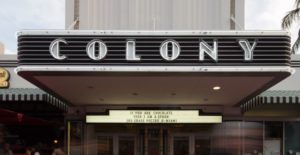 The Colony: A Theatre That Looks Like Miami (The New Tropic | June 29, 2018)
The Colony: A Theatre That Looks Like Miami (The New Tropic | June 29, 2018)
Miami has a multilingual and multicultural voice, and the Colony Theatre, along with Miami New Drama, is making sure to magnify it on stage for a local and international community.
Today, the Colony Theatre stands on Lincoln Road opening its doors to everyone in Miami and shares the responsibility of telling the diverse stories that have created the city. With that duty, the Colony can pave a way for what “the future of art in America can be,” says the theatre’s Artistic Director Michel Hausmann. Read more here.
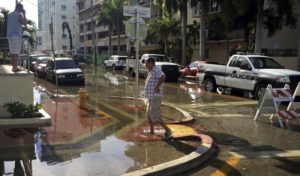 The High Cost Of Living By The Water (Tom Hudson & Alexander Gonzalez | WLRN | October 12, 2018)
The High Cost Of Living By The Water (Tom Hudson & Alexander Gonzalez | WLRN | October 12, 2018)
Floridians pay a price for living by the coast. Hurricane Michael, which made landfall just shy of a Category 5 storm, ravaged the Panhandle and Big Bend area. The storm destroyed neighborhoods and washed out roads – changing lives forever.
Meanwhile, South Florida faced the peak of king tide season. This year, the highest of high tides brought spotty flooding across the region. Read more here.
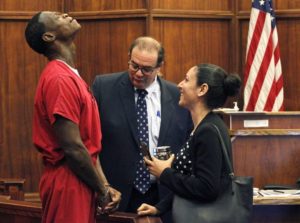 With help from journalism students, Miami man freed after 12 years behind bars for murder (David Ovalle | Miami Herald | October 16, 2018)
With help from journalism students, Miami man freed after 12 years behind bars for murder (David Ovalle | Miami Herald | October 16, 2018)
One month after a judge ordered a new trial and cast doubt on the evidence against him for murder, Andre Gonzalez is a free man.
Prosecutors on Tuesday dropped the case against Gonzalez, who spent 12 years behind bars for a murder outside a North Miami-Dade nightclub, a killing his defense lawyers said he did not commit. Gonzalez, who was also known in court records by the alias Tony Brown, walked out of jail just before noon.
“The sun and the breeze just felt so wonderful, knowing I’m walking on real pavement,” Gonzalez said of walking out of jail. “It’s been such a long time and hard struggle. It’s a wonderful feeling right now.” Read more here.
About the Author
 Martha Cecilia Ovadia is TFN’s senior program associate for equity and communications. Contact her at marci@www.fundersnetwork.org.
Martha Cecilia Ovadia is TFN’s senior program associate for equity and communications. Contact her at marci@www.fundersnetwork.org.
Inside Policy with the Robert Wood Johnson Foundation team
By Julie Seward, TFN Inside Policy
TFN recently launched the second installment of Inside Policy, a series of webinars, blog posts and other learning opportunities that allow funders to explore emerging policy trends and their potential impacts on people and communities – as well as the important role philanthropy can play in effectively advocating for and responding to policy changes.
In a time of turbulent politics, the Robert Wood Johnson Foundation (RWJF) routinely succeeds in supporting non-partisan policy action through its grantees and partners. The Funders' Network (TFN) recently sat down with members of the RWJF team about the Foundation’s policy work at the national, state and local levels.
Why does RWJF choose to work in the policy arena?
Policy has been part of RWJF’s work since our founding in 1972. If we want to deliver on our mission to improve the health and well-being of everyone living in America, informing policy through research, technical assistance, and advocacy is essential. Policy change reaches a large number of people, is long-lasting, changes norms, and can address structural barriers to equity. Over the years we’ve developed strategies to advance targeted policies, while also raising awareness about how social, economic, and community conditions affect health. Both are important.
How do you advance your policy agenda?
Keeping an eye on the Foundation’s core priorities, RWJF pursues a variety of policy goals– for instance fighting childhood obesity, seeking clean indoor air, and supporting early care and education opportunities. To advance these goals, we then support research, strategic communications and awareness-building, community engagement and non-lobbying advocacy. We also work with grantees and partners to develop timely data and analyses to educate policy audiences about the issues that are important to improving health and well-being. RWJF is interested in both public- and private-sector policy. We have a small cross-cutting central policy unit, but our work filters through communications and our program areas and, in turn, their partners.
There are so many policy issues to tackle. How do you sift and select your resource investments?
We carefully consider policy gaps, alignment with our priorities, the strength of evidence, the likelihood for impact, and legal and reputational considerations. In addition, health equity—everyone having a fair and just opportunity to be healthy-- is a fundamental principle in all of our policy and program work. There is, of course, no shortage of opportunities to inform policy, so we take a thoughtful, strategic approach to all of our decisions.
One recent spotlight has been your childhood obesity policy work in New Jersey. What is the genesis and impact of that work?
New Jersey is our headquarters so we decided to tackle childhood obesity close to home. The goal is twofold: enable localities to act on an array of interrelated childhood obesity issues and catalyze policy change via state and local governments and organizations. In many ways it is a great example of how we do our policy work.
The New Jersey YMCA State Alliance was selected as our statewide partner since its members are in most New Jersey communities and they are trusted for their work with kids. The Alliance is also a policy star. RWJF targeted five cities with childhood obesity problems and wide geographic, demographic and cultural range: Trenton, Camden, Vineland, New Brunswick and Newark. Each locality implemented a collaborative policy strategy and work plan that impacts childhood obesity at the city or county level. Results are encouraging. Vineland, for instance, implemented policy changes with such success that the lead organization won National Institute of Health funding to expand its work into the surrounding county. Trenton received national recognition for its Complete Streets strategy. In addition, the Alliance worked with Philadelphia-based Food Trust to secure private funding to work with corner stores around the state to stock and sell healthier items. And there was one other pivotal impact. On-the-ground outcomes were coupled with building the capacity of local Ys to connect local policy change with more traditional child wellness endeavors.
Bottom line, what does RWJF’s policy commitment mean to communities?
At the end of the day, solid policy engagement expands the capacity of RWJF and its partners to change systems and help people live the healthiest lives possible. That can be a game changer.
To learn more about the community benefits of Robert Woods Johnson's health policy initiatives, click here.
RWJF Team
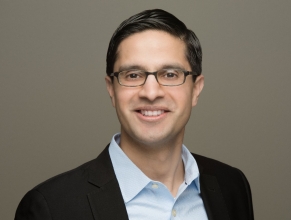 Giridhar Mallya
Giridhar Mallya
Senior Policy Officer
Physician and Health Policy Expert
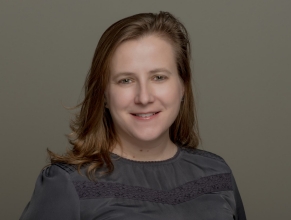
Monica Hobbs Vinluan
Senior Program Officer
Health and Government Relations
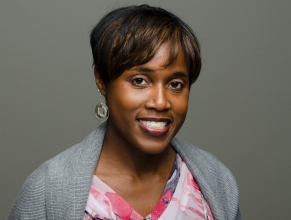
Jasmine N. Hall Ratliff
Program Officer
Former New Jersey lead with focus on under-served communities
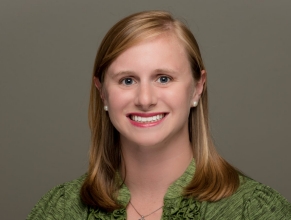 Kaitlyn Meirs
Kaitlyn Meirs
Program Associate
Healthy Places and Practices Catalyst
About the Author
 Julia Seward is currently leading TFN’s Inside Policy efforts, a series of webinars, blogs and learning opportunities that explore emerging policy trends and their potential impacts on people and communities.
Julia Seward is currently leading TFN’s Inside Policy efforts, a series of webinars, blogs and learning opportunities that explore emerging policy trends and their potential impacts on people and communities.
Going PLACES: Redefining the problems with segregation
By Joanna Trotter, Senior Program Officer, The Chicago Community Trust
As a Chicagoan visiting Buffalo, N.Y. for my first time with my amazing PLACES colleagues, I was surprised at how familiar this smaller urban city felt to me. Despite the size difference, it in many ways felt like home. Was it the shared Great Lakes identity? Or was it the similar migration history? Was it the common industrial and transportation past? Maybe. But even more so, what I identified with in Buffalo was the shared long-term and highly visible impacts of racial and economic inequality.
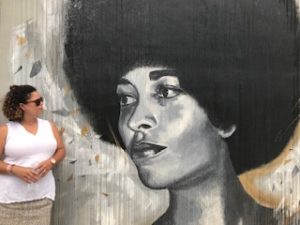
Chicago and Buffalo are linked by an unseemly legacy of racial segregation. According to a variety measurements and sources, both cities are ranked in the top 10 most segregated cities in the United States. In 2017, the Metropolitan Planning Council (MPC), in partnership with the Urban Institute, went a step further in Chicago to look at our entire region. The city of Chicago is well known for its segregation. However, what MPC found is that as we have continued to grow as a region, our segregation patterns held up as we sprawled into seven counties, making us the fifth most economically and racially segregated region in the nation. The Cost of Segregation study quantified that living separately costs the Chicago region $4.4 billion in lost wages, $8 billion in Gross Domestic Product, over 80,000 young people the bachelor’s degree they need to fulfill their potential, and hundreds of lives cut short by the violence that unequal opportunity and isolation produces.
As I toured Buffalo, I observed familiar signs of uneven economic recovery, where investment was increasing in some communities, while other neighborhoods are still devastated by foreclosure. It shows up in a similar tale of two cities paradigm where displacement is not predominately characterized by gentrification like you may find in areas like Los Angeles and San Francisco, but instead is a combination of heightened market pressures is some communities and an outmigration of people of color due to limited opportunities in others. In Buffalo, we learned that a full two-thirds of the black and Latinx population lives in high poverty neighborhoods. We learned that the average white household income is almost $20,000 more annually than the average household of color and white homeowners enjoy over 2.5x the home value of homeowners of color.
Chicago and Buffalo are also both losing population, a rarity in US urban cities today. Buffalo dropped from the 580,000 people in the 1950s to 261,000 today. In Chicago, we’ve been able to ascribe our loss to an exodus of people of color. From 2000 to 2010, we lost just short of 200,000 people. Almost ninety percent of this loss is attributed to African American outmigration. We are hemorrhaging our diversity and the small population uptick Chicago experienced recently is due to an in-migration of higher-wage and less-diverse residents.
Taking this all into consideration, a conclusion one would logically draw is that to address segregation, you must increase integration. However, the Cost of Segregation study spurred our region to have open and difficult conversations about segregation, racism, and integration. It became apparent that we can no longer frame the solution to segregation simply through integrating communities, schools, or neighborhoods. Equitable policies and practices must take precedent.
I live in a racially segregated African American community in Chicago: South Shore. South Shore holds a rich history, boasts direct proximity to the beautiful Lake Michigan shoreline, is economically diverse, has unmatched architecture, and provides a 15-minute comfy commuter rail ride to downtown Chicago. Michelle Obama grew up in South Shore and she and Barack were married in this neighborhood. Even more importantly, South Shore residents have been working for decades to support investment. However, national retailers continue to overlook this community. Absentee property owners sit on vacant lots and hold vacant buildings hostage. Unscrupulous investors continue to prey upon our dense multifamily housing stock with investments schemes that hold buyers and renters hostage. Just this summer, our community was the epicenter of yet another police shooting of a young African American man. So, to approach a neighborhood like South Shore and posit integration as the solution neglects to directly confront the fact that segregation in itself is not the problem. For a community like mine and East Buffalo, why should it take white people to move in to receive adequate investments in our schools, commercial investment in our business corridors and better policing practices?
No, the problem with integration as a solution is it lets structural racism off the hook. We must directly confront inequitable public and private practices that become all too efficient and endemic in segregated communities. And, we must cease problematizing communities of color and not questioning segregated white communities, which is often what integration approaches propose or insinuate.
While Chicago is a big city that often prides itself on civic engagement and boldness, we have a lot to learn from Buffalo. During our stay, the PLACES Fellows learned about Buffalo’s Racial Equity Roundtable, which is bringing together stakeholders across sectors to drive equitable outcomes in the areas of education and job readiness, criminal justice and safety, quality of life and neighborhoods, and income and wealth. They have effectively made the case for why racial equity must be at the center of Buffalo’s resurgence and are not only convening, they are driving change by holding each other accountable for quantifiable targets and real outcomes all aimed at closing equity gaps. They have influential leaders at the table, from the mayor to CEOs, to heads of anchor institutions. And while I left the presentation curious about the role of grassroots leaders and residents in roundtables such as this, I also was envious of the type of leadership Buffalo has at the table committed to this type of change.
In Chicago, we are seeing movement and even recently our Cook County Board President has prioritized racial equity in her new policy roadmap. And with our incumbent mayor announcing his intent not to run for reelection, we may have an opportunity to influence the next mayor’s policy platform. We also enjoy a committed and collaborative philanthropic community and can boast that we now have six major area foundations now led by people of color; a change that has taken place in just under five years. Are the stars aligning for us? I can only hope.
Catch up on our last Going PLACES blog here.
About the Author
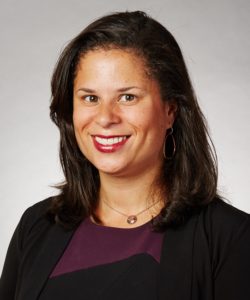 Joanna Trotter is the senior program officer in economic and community development for The Chicago Community Trust. Trotter leads grant making that supports regional and community-based organizations forwarding equitable development. Prior to joining the Trust, Trotter served as director of neighborhood development for the University of Chicago’s Office of Civic Engagement where she guided and coordinated University investments largely in the Woodlawn and Washington Park communities. Trotter also spent ten years forwarding the Metropolitan Planning Council’s community building work across the seven-county Chicago region. By providing technical assistance and support to communities, Trotter worked to inform and increase opportunities consistent with MPC’s broader policy goals of creating a more equitable, sustainable and competitive region, such as enhancing local connections between housing, employment and transportation. In 2013, she was promoted to vice president of programs, directing MPC’s community development activity and providing leadership to the organization as whole as part of MPC’s management team. Prior to MPC, Trotter was the commercial district planner for DevCorp North (now the Rogers Park Business Alliance), the community and economic development organization in Rogers Park. Trotter serves as the co-chair of the Urban Land Institute (ULI) Public Policy Committee and is on the board of the Quad Communities Development Corporation. Trotter earned a M.A from the University of California Los Angeles in Urban and Regional Planning.
Joanna Trotter is the senior program officer in economic and community development for The Chicago Community Trust. Trotter leads grant making that supports regional and community-based organizations forwarding equitable development. Prior to joining the Trust, Trotter served as director of neighborhood development for the University of Chicago’s Office of Civic Engagement where she guided and coordinated University investments largely in the Woodlawn and Washington Park communities. Trotter also spent ten years forwarding the Metropolitan Planning Council’s community building work across the seven-county Chicago region. By providing technical assistance and support to communities, Trotter worked to inform and increase opportunities consistent with MPC’s broader policy goals of creating a more equitable, sustainable and competitive region, such as enhancing local connections between housing, employment and transportation. In 2013, she was promoted to vice president of programs, directing MPC’s community development activity and providing leadership to the organization as whole as part of MPC’s management team. Prior to MPC, Trotter was the commercial district planner for DevCorp North (now the Rogers Park Business Alliance), the community and economic development organization in Rogers Park. Trotter serves as the co-chair of the Urban Land Institute (ULI) Public Policy Committee and is on the board of the Quad Communities Development Corporation. Trotter earned a M.A from the University of California Los Angeles in Urban and Regional Planning.
Houston on the ground: Helping funders see the city in a new light
By Raj Mankad, Editor of Cite, a publication of the Rice Design Alliance
"I thought that Houston was a large sprawling mass that lacked a soul, and I couldn't have been more wrong," wrote one participant after The Funders' Network (TFN) 2018 Annual Conference in Houston. His change of mind did not come about from a typical Chamber of Commerce tour through the city's most polished areas. Rather, his change of heart came from a conference focused on Houston's best efforts to address environmental injustices, displacement of low-income communities, climate change, and other pressing challenges.
Last year I was invited to participate in a planning session for the upcoming TFN conference in Houston, which took place just seven months after Hurricane Harvey made landfall. I found myself in a room full of many of the Houstonians I admire and funders from around the country. I wished that everyone in Houston could have shared my seat at this meeting. The power of funders is not simply in their capacity to fund projects but their ability to convene people from across sectors and frame important questions. I was honored to have a role in planning the mobile workshops with the Funders' Network staff and dozens of local leaders. As the editor of Cite: The Architecture and Design Review of Houston, I saw the tours as an opportunity to share hard-earned optimistic perspectives from the city with a broad public in the city itself. We recently highlighted the four mobile workshops created for last year's TFN conference on our blog. (Click on the links below for full descriptions and other resources.)
Houston Tours
Third Walking Tour: Emancipatory Art and Equitable Development
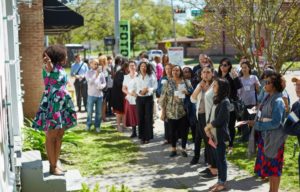 In this historic black neighborhood, artists are not just at the decision-making table - they built and set the table. Project Row Houses has long received international attention for its adaptive reuse of a block of row houses for art installations and for housing young mothers. In recent years, the organization has convened churches, residents, foundations, businesses, architects, real estate experts, and others to create a comprehensive approach to affordable housing, parks, safety, arts, schools, and more as rising land prices and speculative development threaten to displace the longstanding community. This tour gives a window into that work while taking you through the art installations, a food co-op, a bakery, and the rebuilt Emancipation Park.
In this historic black neighborhood, artists are not just at the decision-making table - they built and set the table. Project Row Houses has long received international attention for its adaptive reuse of a block of row houses for art installations and for housing young mothers. In recent years, the organization has convened churches, residents, foundations, businesses, architects, real estate experts, and others to create a comprehensive approach to affordable housing, parks, safety, arts, schools, and more as rising land prices and speculative development threaten to displace the longstanding community. This tour gives a window into that work while taking you through the art installations, a food co-op, a bakery, and the rebuilt Emancipation Park.
Ship Channel Tour: Fenceline Communities
 Guided visits through Manchester and other communities along the Houston Ship Channel are typically framed as "toxic tours." While this tour takes you deep into the industrial landscape of Houston and shows the disturbing juxtapositions of refineries and houses, it emphasizes the perspectives of the people who live there and love their communities, including Juan Flores, a former city council member of Galena Park. You experience the mature live oaks, the small-town feel, the historic landmarks, and the potential for a different relationship among people, industry, and the environment.
Guided visits through Manchester and other communities along the Houston Ship Channel are typically framed as "toxic tours." While this tour takes you deep into the industrial landscape of Houston and shows the disturbing juxtapositions of refineries and houses, it emphasizes the perspectives of the people who live there and love their communities, including Juan Flores, a former city council member of Galena Park. You experience the mature live oaks, the small-town feel, the historic landmarks, and the potential for a different relationship among people, industry, and the environment.
Bayou Greenways Bike Tour: Lessons in Urban Design on Brays Bayou
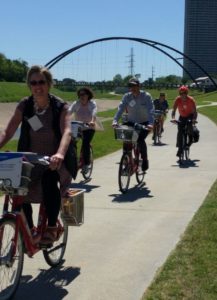 In 1912, landscape architect Arthur Comey proposed that Houston should preserve its bayous and floodways as linear parks with trails. One hundred years later, Houston voters overwhelmingly passed a $100 million bond matched by private funding to realize and expand on this vision by building hike-and-bike trails along all major bayous, connecting jobs, schools, parks, and people of all means and backgrounds. The framework for a more resilient city designed with nature was put in place before Hurricane Harvey hit. The tour takes you through parks to the port.
In 1912, landscape architect Arthur Comey proposed that Houston should preserve its bayous and floodways as linear parks with trails. One hundred years later, Houston voters overwhelmingly passed a $100 million bond matched by private funding to realize and expand on this vision by building hike-and-bike trails along all major bayous, connecting jobs, schools, parks, and people of all means and backgrounds. The framework for a more resilient city designed with nature was put in place before Hurricane Harvey hit. The tour takes you through parks to the port.
Gulfton Walking Tour: First Stop for Houston's Immigrants and Refugees
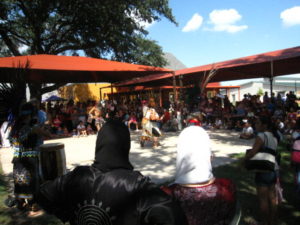 An unprecedented level of coordination, from legal services to healthcare to refugee resettlement to education, is taking place in Gulfton, an area initially built in the 1970s for young professionals and now home to families from around the world. The area has the life and density associated with early twentieth-century Brooklyn but in a "suburban" built environment.
An unprecedented level of coordination, from legal services to healthcare to refugee resettlement to education, is taking place in Gulfton, an area initially built in the 1970s for young professionals and now home to families from around the world. The area has the life and density associated with early twentieth-century Brooklyn but in a "suburban" built environment.
In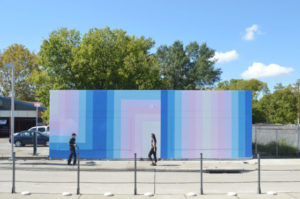 a city without traditional zoning, community-based planning has proven transformative. When Houston METRO announced plans to extend a light rail line through the Near Northside, residents both welcomed and feared the change it might bring. The area has long been an affordable and welcoming place from immigrants. The GO Neighborhoods program began with a listening campaign and established a Quality of Life agreement that has provided an organizing vision for a remarkable number of public and private efforts that have managed the change that has come in line with the ambitious dreams of residents.
a city without traditional zoning, community-based planning has proven transformative. When Houston METRO announced plans to extend a light rail line through the Near Northside, residents both welcomed and feared the change it might bring. The area has long been an affordable and welcoming place from immigrants. The GO Neighborhoods program began with a listening campaign and established a Quality of Life agreement that has provided an organizing vision for a remarkable number of public and private efforts that have managed the change that has come in line with the ambitious dreams of residents.
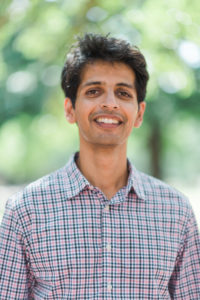
About the Author
Raj Mankad has served as Editor of Cite, a publication of the Rice Design Alliance at Rice University, since 2008.
#TFNMiami Spotlight | Resilience in South Florida, red tide, and early voting
By Martha Cecilia Ovadia, Senior Program Associate, Equity & Communications
In advance of TFN's 2oth Anniversary Conference: Power Forward in Miami, we'll be sharing interesting and insightful resources that provide context for many of the issues we'll explore as part of our annual conference, which takes place March 18-20, 2019.
Don't forget to catch our weekly #MiamiSpotlight and #TFNMiami news on our twitter (Funders_Network) and facebook (Funders' Network for Smart Growth and Livable Communities) feeds, and check out our TFN 20th Anniversary: Power Forward annual conference page for updates on speakers and sessions.
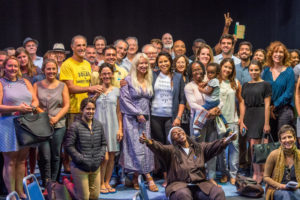 From Traffic To Sea-Level Rise, South Florida Has Many 'Resilience' Issues. Here's What That Means (Kate Stein | WLRN | August 3, 2018)
From Traffic To Sea-Level Rise, South Florida Has Many 'Resilience' Issues. Here's What That Means (Kate Stein | WLRN | August 3, 2018)
There's a buzzword among people who work on quality-of-life issues in South Florida: "Resilience."
It’s a concept we often apply to a person, someone who's able to cope with difficult circumstances. But more and more, the word is being used in the context of how communities respond to issues like traffic, hurricanes, affordable housing and rising seas.
At a town hall at WLRN on July 30, people from local government, neighborhoods and non-profits gathered to talk about what "resilience" is and how to build more of it. Read more here.
 Miami-Dade approves ‘rapid-transit’ bus plan over Metrorail expansion in South Dade (Douglas Hanks | Miami Herald | Aug. 30, 2018)
Miami-Dade approves ‘rapid-transit’ bus plan over Metrorail expansion in South Dade (Douglas Hanks | Miami Herald | Aug. 30, 2018)
Miami-Dade’s transportation board approved giving South Dade the county’s first rapid-transit bus system, rejecting demands that elected leaders stick with a 2002 promise to bring a costly Metrorail extension to the region. Read more here.
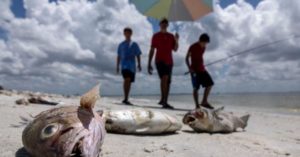 How climate change is making ‘red tide’ algal blooms even worse (Angela Fritz | Washington Post | Aug. 5, 2018)
How climate change is making ‘red tide’ algal blooms even worse (Angela Fritz | Washington Post | Aug. 5, 2018)
Red tide is killing Florida’s southwest coast. Fish, manatees, sea turtles — some of them endangered — and nine dolphins have washed up dead on the beaches, and all of them are confirmed or suspected to have been poisoned by the algal bloom. The body of a young whale shark was found on a beach in late July, and biologists believe that it was the first known whale shark to have been killed by red tide.
Now the toxic algae — Karenia brevis — is working up the coast from Sanibel Island to Tampa Bay. Respiratory irritation in humans has been reported as far north as Manatee County, just south of Tampa Bay, where high concentrations of the algae were measured last week. The water off Pinellas County — Clearwater, Largo, St. Petersburg — had elevated concentrations of red tide beyond a normal “background” state for the first time this month. Read more here.
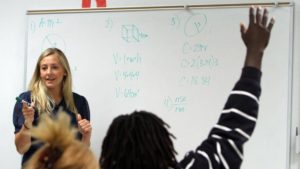 Florida must prioritize public schools over charter schools, influencers say (Adam Wollner |Miami Herald| Sept. 17)
Florida must prioritize public schools over charter schools, influencers say (Adam Wollner |Miami Herald| Sept. 17)
Charter schools play an important role in Florida’s education system but should not be prioritized over traditional public K-12 schools, according to a panel of the state’s leading voices.
In a new survey of the Florida Influencers, a group of prominent political and policy figures from across the state, a majority (77 percent) said they support a recent Florida Supreme Court decision removing a ballot measure that would have eased the path for creating new charter schools. And a plurality (46 percent) said it was “not important at all” for the next governor and legislature to expand the number charter schools in Florida. Read more here.
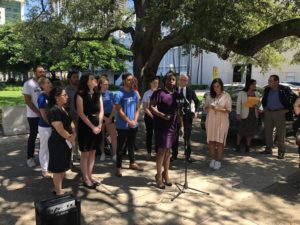 Civil Rights Groups Pressure Miami-Dade County For Early Voting On College Campuses (Jessica Bakeman | WLRN | Sept. 13, 2018)
Civil Rights Groups Pressure Miami-Dade County For Early Voting On College Campuses (Jessica Bakeman | WLRN | Sept. 13, 2018)
Local chapters of the American Civil Liberties Union, the League of Women Voters and several other groups are calling on Miami-Dade County to offer early voting on college campuses here.
The groups argue college students often lack transportation to get to the polls, and many have classes or work obligations on Election Day. So they could be disenfranchised without access to early voting on their campuses. Read more here.
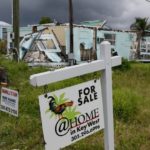 Hurricane Irma: Unseen by tourists, thread of Keys’ society unraveling (Kimberly Miller | Palm Beach Post | Sept. 8, 2018)
Hurricane Irma: Unseen by tourists, thread of Keys’ society unraveling (Kimberly Miller | Palm Beach Post | Sept. 8, 2018)
A year after Hurricane Irma battered the Florida Keys, the iconic island chain is open for business, beckoning tourists in search of candy-coated sunsets, tropical solace — their lost shaker of salt.
The sandal factories, shell worlds, and key lime stands advertise their colorful kitsch along the Overseas Highway that carries pilgrims to the promised land of sweet libations and Hemingway lore.
But scratch the surface of that coconut-scented veneer and a different side of Hurricane Irma recovery is revealed.
A thread of Keys society — musicians, artists, old-school Conchs and workaday Joes — is unraveling. Read more here.
About the Author
 Martha Cecilia Ovadia is TFN’s senior program associate for equity and communications. Contact her at marci@www.fundersnetwork.org.
Martha Cecilia Ovadia is TFN’s senior program associate for equity and communications. Contact her at marci@www.fundersnetwork.org.
Know Your Network: Maranda Witherspoon, PLACES Alumni

By Martha Cecilia Ovadia, Senior Program Associate, Equity & Communications
Who are the people that make up the Funders’ Network? Know Your Network is an occasional Q&A series featuring our members and PLACES alumni. This month, we chat informally with Maranda Witherspoon, a 2015 PLACES alum, formerly of Missouri Health Foundation, now the CEO of MWR Coaching and Consulting.
Interested in becoming a PLACES Fellow? Applications for the 2019 Fellowship are due Nov. 1. Learn more here.
1. You are an alum of the 2015 PLACES class. As a fellow, what was your favorite site visit or experience in your year? What was the most challenging experience?
My favorite site visit was Fresno, California. Fresno challenged my thinking and helped shape my philosophy on “thoughtful” community engagement and how I can personally become more intentional about using my voice to be an advocate for change.
The most challenging visit for me was St. Louis. As a St. Louis native, it was difficult to step into the space open to learning while remaining objective throughout the site visit.
2. We have a challenge for you: If you had to describe 2018 in seven words, what would they be?
“Man, what a year to be alive!”
3. Let me ask you something — if you could spend the day with an one person, dead or alive, and have a lunch and learn with them, who would it be?
Jay Z hands down! He is the best rapper alive – lets debate if you disagree! But seriously, his journey is amazing and inspires me. He went from illegal activity in his youth to succeeding in the music industry as a rapper later in life (than the average artist). He has so many successful businesses and he has even visited the White House! I admire how he gives back financially to support causes that elevate people who often feel powerless. I am sure he has tips to share with me on achieving success while remaining grounded.
4. You moved from the philanthropic sector into consulting and coaching nonprofits and foundations —how has your transition been and what would you say to anyone else who is thinking of moving into the consulting side of philanthropy?
My transition from philanthropy overall has been smooth and worthwhile. I have been afforded the opportunity to leverage my philanthropic relationships to further advance my mission of transforming lives, engaging communities, and advancing equity by working with and in communities least served. I am grateful to be in position to work on projects that align with my passion and core values.
My advice is to figure out what you are passionate about and run with it! Because we all have experience with moving money, as a consultant you can create opportunities to further educate foundation staff on various ways to support community gaps and/or opportunities while being hands on with the work and communities – priceless!
5. We have been asking almost everyone we interview about self care. What is something you do as a practice of self-care that helps you to be a better consultant and facilitator?
As a practice of self-care I fellowship with family and friends. I also workout and prioritize travel—the non-work kind! When I am not working these are the things that take up my time (and funds). And I regret nothing! I encourage people to identify 1-3 things they enjoy doing and do them!
6. What is something you think would surprise people about you?
I want to convince my husband we should buy a tiny home! Please note I have closets full of clothes, shoes, etc. and I am not always good at downsizing...
But tiny house here we come!
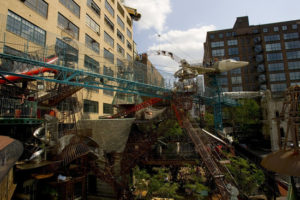
7. Tell me about your own hometown—what makes it special? Is there a special business or shop you would say is a “can’t miss”?
Let’s see, St. Louis, Missouri – the most northern southern city and state! St. Louis is special to me because it is home and plentiful of family and friends that I care about. I am asked all the time, “Why am I still here?” And my response is always, “This is home and I can’t physically move and give my all to another city and not put that same energy into home!”
If you come to St. Louis, you have to try Imos Pizza – the square beyond compare! I recommend you have a slice of gooey butter cake. It is absolutely delicious. Oh! I also recommend you visit the City Museum – there is nothing like it anywhere else.
About the Author
Martha Cecilia Ovadia is TFN’s senior program associate for equity and communications. Contact her at marci@www.fundersnetwork.org.
Going PLACES: The Process of Thinking, Feeling, and Acting
By Rebecca Chan, Program Officer for Creative Learning, LISC
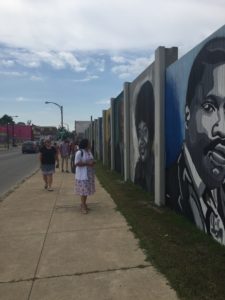
As I landed in Buffalo for the second PLACES site visit of 2018, I felt a sense of excitement and trepidation. I was eager to reconnect with my PLACES cohort and to get to know a new-to-me community and place, yet I also knew that the days ahead would be thought-provoking and challenging. As I advance in my personal racial equity journey, the more I can’t “un-see” the way power, race, and inequity shape our environments. My analytical framework sharpens, coming more clearly into focus with each article I read or workshop I attend, the language and tools to communicate crystallizing in turn. Participating in the PLACES Fellowship has only accelerated this process of thinking, feeling, and acting. It is at once exhausting and invigorating.
We opened our Buffalo site visit with a challenge: How will we create a bridge between what we learn during this convening and our own practice? How does the work of racial equity impact one’s personal leadership style, and what will make us proud of how we show up?
This challenge is one that I have wrestled with for years, and also one that, for me, raises more questions than answers. What does it mean to be a person of mixed race, more often than not enjoying the privilege of moving with fluidity between white and non-white spaces? And, as a community development professional that works nationally, how do I exert anti-racist influence, power, and perspective when I am not fixed in place, a perpetual outsider preaching the importance of rootedness and equity? How can these experiences and perspectives translate to my authentic anti-racist leadership style?
Fortunately, the Buffalo PLACES itinerary provided no shortage of great examples on which to draw and learn. We heard from leaders within Buffalo’s smart development and environmental justice community, visited a massive workforce development project, and met with local youth leadership. We heard from leaders in Buffalo’s education space, as well as our philanthropic peers at the Community Foundation for Greater Buffalo, and caught a glimpse of Buffalo’s Underground Railroad history. All in all, a fairly comprehensive look at Buffalo’s community development landscape.
Weeks later, I find myself still mulling over our learning module on implicit bias led by the formidable Dr. Ursaline Bankhead. Implicit or hidden bias refers to the pervasive and subconscious feelings and attitudes that affect our actions and decisions, often associated with race, ethnicity, age, or appearance. In other words, your blind spots. Dr. Bankhead’s lecture was an excellent opportunity to turn the lens on ourselves and think about the ways that we have been unknowingly conditioned to discriminate and judge.
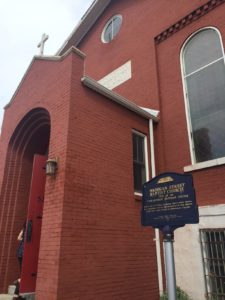
While our time with Dr. Bankhead did not magically reveal my own implicit biases, the training does have me thinking about how racism manifests in extremely ordinary ways. Like a fire drill, I mentally practice what I will say and how I will act when confronted with overtly racist incident. Yet applying an implicit bias lens to the practice of racial equity tells us that we need to be rooting out and undoing our own banal participation in racist systems and constructs. Yes, the work of racial equity is stopping racist action punctuated in a moment, and it is the far less exciting daily practice of observing our own complicity and adjusting our actions and decisions. In the practice of racial equity, there is no good or bad, black or white, racist or not racist. These binaries are constructs, and in fact preserve racism by perpetuating the archetypal “Bad Racist.”
How does this translate to my leadership style? I strive to be a leader who acknowledges that we all have biases and to be generous in spite of this, to never dismiss or discount the experience of others, and to humanize those with perspectives that differ from my own. In a world of grant applications, never-ending emails, and deadlines, I hope to slow down and operate from of platform of humility and nuance.
I am immensely thankful to LISC for investing in my participation in this program; to TFN for curating an amazing experience in Witchita and Buffalo; and for my PLACES cohort for providing space for reflection, patience as we struggle and grow together, and the brain trust as we build the bridge back to our own practice.
About the Author
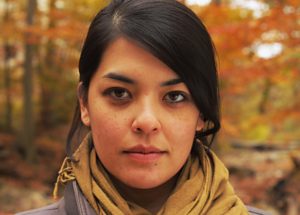 Rebecca Cordes Chan, is the program officer for the National Creative Placemaking Program at Local Initiatives Support Corporation (LISC), a national community development intermediary that provides loans, grants, equity, and technical assistance in underinvested neighborhoods. Prior to joining LISC, Rebecca served as a program officer for the Robert W. Deutsch Foundation, the first Creative Placemaking Fellow for Reinvestment Fund, and Program Director for Baltimore’s Station North Arts & Entertainment District. Rebecca has been recognized as a Fellow of the Salzburg Global Forum for Young Cultural Innovators (2015), a Warnock Foundation Baltimore Social Innovator (2014), and was named to the Baltimore Sun’s “10 People to Watch Under 30” list (2014). She received her MS in Historic Preservation from the Graduate School of Design at the University of Pennsylvania, and a BA in Anthropology from the University of Illinois, Urbana-Champaign.
Rebecca Cordes Chan, is the program officer for the National Creative Placemaking Program at Local Initiatives Support Corporation (LISC), a national community development intermediary that provides loans, grants, equity, and technical assistance in underinvested neighborhoods. Prior to joining LISC, Rebecca served as a program officer for the Robert W. Deutsch Foundation, the first Creative Placemaking Fellow for Reinvestment Fund, and Program Director for Baltimore’s Station North Arts & Entertainment District. Rebecca has been recognized as a Fellow of the Salzburg Global Forum for Young Cultural Innovators (2015), a Warnock Foundation Baltimore Social Innovator (2014), and was named to the Baltimore Sun’s “10 People to Watch Under 30” list (2014). She received her MS in Historic Preservation from the Graduate School of Design at the University of Pennsylvania, and a BA in Anthropology from the University of Illinois, Urbana-Champaign.
SAVE THE DATE! #TFNMiami | March 18-20
By TFN Staff
|
How are we grappling with the stark realities of climate change and other environmental threats to our communities and health? How are we confronting systemic inequities and structural racism? How are we creating economic opportunities that allow people and places to thrive, regardless of their zip codes? Join us for TFN’s 2019 Annual Conference, March 18-20 in Miami, to explore the stories and strategies that address these critical questions. Our 2019 conference theme: Power Forward, a call to action for philanthropy to leverage the sector’s collective power to create communities and regions that are truly sustainable and just — work that has taken on new urgency as we face increasingly challenging times. Join us as we delve into the ways this power can impact policy, community and people across a range of topics such as climate, inclusive economic development and social justice. About #TFNMiamiTFN’s 2019 Annual Conference marks the network’s 20th anniversary, presenting a key opportunity to reflect on our past, explore the present and look forward to the future. We received a record number of responses to our summer call for session proposals, proof of the amazing depth and diversity of expertise across this network of funders and partners. Be sure to visit our #TFNMiami website for more information. Registration opens in December 2018. Stay tuned for updates on the conference agenda, sessions and featured speakers! |
About Our VenueTFN’s 2019 Annual Conference takes place March 18-20 at the Miami Marriott Biscayne Bay, located in Downtown Miami across the bay from South Beach and a short hop to neighborhoods like Wynwood and Little Haiti. (Call 1-800-295-1421 for reservations and mention the FUNDERS’ NETWORK to receive the conference rate or register via this link.) |
Sponsorship OpportunitiesThank you to our funders, partners and other members of the TFN community for supporting our network. Feel free to reach out to me directly for more information on #TFNMiami sponsorship opportunities. You can also download our sponsorship packet here. |
 |
|
|
|
|
Inside Policy with Bob Jaquay of The Gund Foundation
By Julie Seward, TFN Inside Policy
TFN recently launched the second installment of Inside Policy, a series of webinars, blog posts and other learning opportunities that allow funders to explore emerging policy trends and their potential impacts on people and communities – as well as the important role philanthropy can play in effectively advocating for and responding to policy changes. Be sure to register for our upcoming Inside Policy funder briefing: Balance of Power: How Courts and States are Impacting Policy, 1 p.m. ET Sept. 24.
For many years, The George Gund Foundation has supported grantees engaged in public policy thought leadership and advocacy. Through this work, Gund grantees have chalked up impressive wins for Northeast Ohio. Bob Jaquay, associate director at the foundation, talks with TFN about why being attentive to the functioning of government is important and how foundations can make a difference to the nonprofits and communities they serve.
Why does federal, state and local policy resonate at the Gund Foundation?
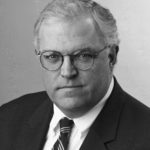
We see public policy advocacy as a very important function of the nonprofits we support. Public policy greatly impacts the very same people nonprofits exist to serve. Consequently, we believe that our foundation should help non-profit leaders to effectively represent the interests of their clients to government.
How did you become involved with public policy?
During my college years, I served on an advisory committee for my hometown’s use of federal Community Development Block Grant funds. I saw first-hand how federal policy was implemented at a local level. Immediately after college, I was a Congressional committee staffer and gained a healthy respect for the legislative process. Shortly after joining the Gund Foundation, I contributed a review of the book A Voice for Nonprofits to Shelterforce magazine. My perspective as a grant maker and foundation lawyer was deeply influenced by that book.
How does Gund carry out its day-to-day policy interests?
Policy advocacy is woven into the work of each of Gund’s program areas – Arts, Community Revitalization & Economic Development, Human Services, Education and Environment. The substance varies by program, but our strategic approach has similarities, too.
I’m most familiar with Community Revitalization & Economic Development. Our foundation has supported research at Brookings and local think tanks and academic institutions that informs advocacy. We provide opportunities for grantees to learn nonprofit rules pertaining to lobbying, advocacy and voter engagement from experts at the Alliance for Justice and Cleveland Votes, the local affiliate of America Votes. We urge our grantees to work together, to formulate a coherent message about how a public policy affects members of our community.
It sounds like partnerships are one key to policy success. How do you team with community and philanthropic partners to accomplish policy goals?
Gund thinks carefully about finding partners and building coalitions that care about common policy issues. Many of these coalitions seek high-profile leaders from the business community. Other coalitions are intentionally built with people from across the political spectrum.
As I mentioned earlier, our foundation has partnered with numerous think tanks and academic institutions that conduct research. We frequently participate with other funders through national affinity groups. Our regional association, Philanthropy Ohio, also has been important to advancing a philanthropic perspective on state-wide policy issues, particularly in the areas of education, healthcare and early childhood programs.
If others are interested in further thinking about the roles of nonprofits in policy, what is a starting point for learning?
I suggest checking out the Bolder Advocacy pages produced by the Alliance for Justice. The sections on 'Navigating the Rules' and ‘Focus on Foundations’ are excellent places to start.
More on Gund
This summer, The George Gund Foundation extended its commitment to state and local voter advocacy through grants to these organizations, with a goal of increasing participation of historically underrepresented populations, encouraging racial and economic fairness in voter registration and helping all citizens participate in a healthy political system.
- The Ohio Organizing Collaborative, a coalition of more than 20 groups working for social, racial and economic justice through voter registration, criminal justice reform, and student organizing and leadership.
- Ohio Voice, a statewide nonprofit coalition working to increase the collective influence of its members and constituencies through coordinated, nonpartisan civic engagement, especially for historically marginalized populations.
- Northeast Ohio Voter Advocates, Inc., a volunteer-led voter registration, research and advocacy organization serving the needs of underrepresented citizens and students in the Cleveland area.
Gund’s annual report chronicles the role of the arts in public discourse and community expression. Read the full report here.
About the Author
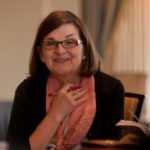 Julia Seward is currently leading TFN’s Inside Policy efforts, a series of webinars, blogs and learning opportunities that explore emerging policy trends and their potential impacts on people and communities.
Julia Seward is currently leading TFN’s Inside Policy efforts, a series of webinars, blogs and learning opportunities that explore emerging policy trends and their potential impacts on people and communities.


